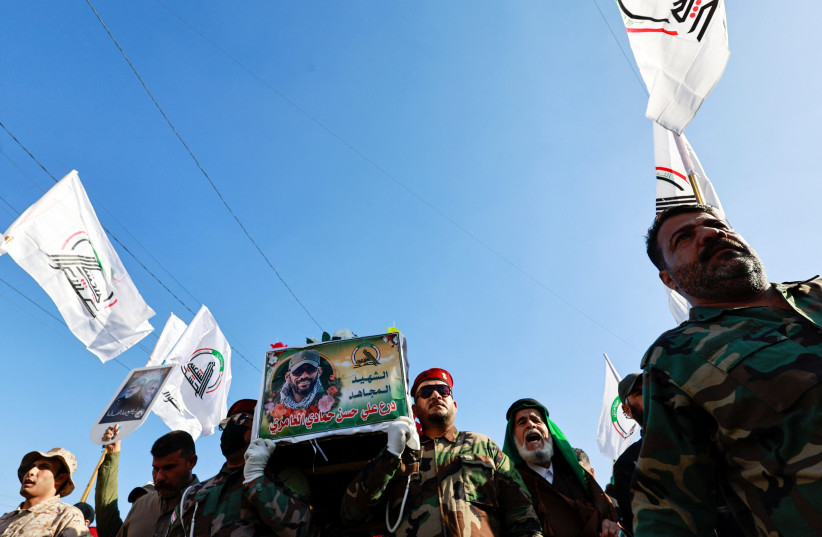Kataib Hezbollah’s threats to Israel, Saudi are further Iranian escalation
An Iranian-backed militia in Iraq threatened Israel and Saudi Arabia in a statement posted on its Telegram account on Saturday. The threat by Kataib Hezbollah is important because it is directed at both Israel and Saudi Arabia and represents another escalation by Iranian-backed groups in the region. Kataib Hezbollah is one of the key Islamic Revolutionary Guard Corps (IRGC)-backed groups in Iraq and its statements and actions usually reflect Iran’s policies in the region.
The group slammed America as “evil and criminal” and accused it of “participating in the killing of the Palestinian people by supporting the Zionists and supplying them with thousands of tons of bombs to commit massacres.” The group released the statement in the wake of the Israeli targeted attack on Hamas commanders in southern Gaza on Saturday.
Kataib Hezbollah accused Israel of “genocide.” It then said, “the countries of normalization, and the malicious role of Saudi Arabia’s rulers in harnessing their land routes to perpetuate the momentum of the battle against the Palestinians, as an alternative to the sea routes, will not pass, and the Kingdom of Evil will pay the price for its action as its masters paid it in the Red Sea.”
The statement therefore threatens Israel, Saudi Arabia, the US, and also bashes Bahrain and the UAE, which normalized relations with Israel in 2020 as part of the Abraham Accords. “The Zionist enemy only understands the language of weapons, and what is taken by force can only be recovered by force, which requires raising the pace of operations by the axis of resistance against the entity, intensifying support for the people of Gaza, and strengthening its steadfast resistance.”

This statement has several key parts. It is part of a long history of Kataib Hezbollah spearheading Iranian proxy warfare in the region. The statement reflects its historic policy of targeting the US, Israel, and US allies. The group has targeted Saudi Arabia in part, US troops in Iraq and Syria, and also it killed three US soldiers in Jordan in January.
Attacks on Israel
Iraqi-based militias have also increased attacks on Israel recently. Therefore, Kataib Hezbollah is often at the forefront of these types of new emerging threats. Its statement reflects this type of escalation. By mentioning Saudi Arabia it may hint at future attacks. However, Iran and Saudi Arabia reconciled last year and Iraq played a key role in that reconciliation. Therefore Kataib Hezbollah would have to think twice about attacking the Kingdom. On the other hand, it is connecting its threats to the war in Gaza and this is part of rising rhetoric by countries such as Turkey that have sought to pressure Israel to make a ceasefire.
The US is aware of the threat of Kataib Hezbollah. It sanctioned the group back in 2009, and added more sanctions since then, like in November. The US Department of the Treasury noted, for instance, that the group is “trained, funded, and supported by Iran’s Islamic Revolutionary Guard Corps-Qods Force (IRGC-QF), Kataib Hezbollah is behind a spate of recent attacks against the United States and partners in Iraq and Syria following the horrific attacks by Hamas against Israel.”
The threats of Kataib Hezbollah should be taken seriously. As Hamas loses ground in Gaza and loses key commanders, Iran’s proxies may increase their attacks. Iran also wants to try to isolate Israel by threatening countries that have ties to Israel.





Comments are closed.